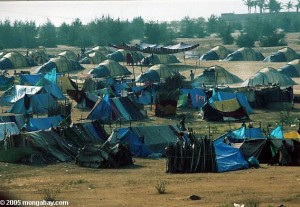Today I was waiting in line at a bank drive-through with the window down, listening to nearby bird songs. Since winter doesn’t leave many birds in the Midwest, hearing them each spring is a special treat. Today their music seemed quite close.
Sure enough, there was a nest just above the ATM sign perched on a tiny ledge. The mama was comfortably nestled in, although with our 88 degree temperatures, she needed have worried about cooling eggs. I snapped a picture and made a mental note to check back for babies.
After making my bank deposit and passing through the lane, I noticed a second nest, this one nestled in a tiny corner next to the bank wall. Another mama was in residence, but this time daddy was on hand, too. I stopped my car and opened the door to get a better camera angle, but he said, “I don’t think so!”
He took a swoop across the roof of my car, circling back immediately for a second pass. Neither of them appreciated my camera or me, and in an instant both daddy and mommy left their ledge and came at me again! I took the hint and drove away.
Both birds followed, looping around my car in wide circles, one of them swooping in front of my windshield as I sat at the nearby stop light. They were black with split tail feathers, and as they flew they flashed orange. Their lack of hospitality notwithstanding, I’ll be watching in coming weeks.
The bank birds reminded me of an incident with two year old Nelson. We lived two blocks from a commuter train station and walked each evening to meet Nate as he arrived. Little Nelson disliked his stroller, preferring to toddle on his own.
His strawberry blond curls bobbed as he walked, and apparently the local birds thought they’d make good nesting material. A couple of red winged blackbirds dove at his head, doing a fast flutter just above him as they plucked at his hair. I shooed them off in a panic, thinking of Alfred Hitchcock, and after that Nelson wore a hat to the train.
Fear tactics aside, nest-making and egg-defending have been programmed into these birds by God himself. Most animals automatically care for and protect their young without any schooling, doing a good job for one reason: they’re following God’s prescribed plan.
Everything works better when we do it God’s way, and that includes human parenting, too. In the Bible he’s detailed exactly what that is, listing do’s and don’ts and including stories of success (following his instructions) and failure (ignoring them). Thinking we might know a better way is laughable at best, catastrophic at worst.
Even now, as the mother of adult children, I want to do it God’s way rather than my own. I’m feathering my nest with slate tile and polyurethane sealant rather than strands of strawberry blond hair, but there’s still a mother-role to play.
My nest is usually empty these days, and I’m not chasing predators away, but as God shows me how, I want to do my best.
“Love never gives up.” (1 Corinthians 13:7a)







